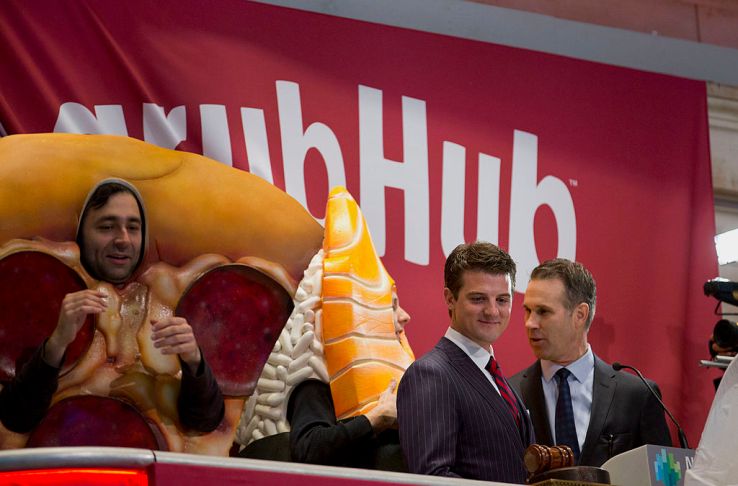As trial begins, GrubHub looks to defend itself as a 1099 employer

On day one of GrubHub v. Lawson, the first-ever case to go to trial in California regarding the debate involving 1099 contractors and W-2 employees in the gig economy, lawyers for both sides presented their opening statements. These statements touched on topics like delivering for multiple on-demand companies, tax deductions, scheduling, the wearing of uniforms and order acceptance rates.
In a packed courtroom (with limited air conditioning) in San Francisco this morning, Shannon Liss-Riordan, the lawyer for plaintiff Raef Lawson, outlined that she’s going to address the broad question of whether gig economy workers should be classified as W-2 employees “in baby steps.”
She noted that the point of this case is not to take on the entire gig-economy, but to bite off a little piece of it. The question in this particular case, Liss-Riordan said, is to figure out if Lawson, an aspiring actor in LA, was a contractor or an employee during the time he drove for GrubHub. Lawson worked for GrubHub from October 2015 to November 2016, when he was fired for allegedly not responding to enough delivery requests.
Liss-Riordan went on to describe how GrubHub had a certain amount of control over Lawson, similar to the way a restaurant would have control over their wait staff. She also described how GrubHub had guaranteed rates and the block system, which was GrubHub’s shift system during the time Lawson drove for the company. Even though GrubHub claimed drivers could work whenever they wanted, Liss-Riordan said the company required drivers to sign up for blocks and they could not log on to drive if it wasn’t their shift.
GrubHub also had priority scheduling for high-performing drivers, which made it easier to get the shifts they wanted, Liss-Riordan explained. In order to be eligible for priority scheduling, the drivers’ order acceptance rates needed to remain high. Otherwise, there were ramifications like no priority scheduling, no weekly bonuses, getting logged off their shift and other penalties, Liss-Riordan said.
“Managers were well aware they had the power to make these types of decisions,” she said.
GrubHub also incentivized drivers to wear a GrubHub shirt and hat, Liss-Riordan said. While it wasn’t required to wear the attire, GrubHub required drivers to use and pay for a GrubHub bag to keep the food warm. If they agreed to wear the shirt and hat, they wouldn’t have to pay for the bag.
GrubHub’s argument
GrubHub, of course, argues that Lawson was an independent contractor who was in business for himself. But Liss-Riordan notes that Lawson was a struggling actor, who was doing work for GrubHub, along with other companies like Postmates and Caviar. He didn’t have his own customers, nor did he hire anyone to help him in this so-called business of his.
Although Lawson did not employ others to help him complete deliveries, he could have, GrubHub lawyer Theodore Boutrous said. That right to be able to hire, Boutrous said, shows that Lawson wasn’t “under GrubHub’s thumb.”
In GrubHub’s opening statement, Boutrous described how Lawson has worked for 11 on-demand companies since 2015, including Jolt, TaskRabbit, DoorDash, Lyft, Uber and Deliv.
“He represents the essence of an independent contractor under California law,” Boutrous said.
After showing Lawson’s deposition, Boutrous said that “if [Lawson] didn’t want to work, he didn’t schedule himself. That’s kind of the ultimate freedom that an employee doesn’t have.”
Boutrous went on to argue that even though there was a block system and there were no guarantees to when Lawson would be able to work, he didn’t have to.
In response to Liss-Riordan’s claim that GrubHub didn’t want Lawson and other drivers to deliver food for competitors, Boutrous said “that’s exactly the opposite,” referencing the contractual agreement that states drivers are able to work for other companies. GrubHub claims Lawson used other apps on more than half of his scheduled blocks, and didn’t even know Lawson was using other services until the discovery portion of the case.
“So far from being subjected to GrubHub’s control, he never had to complete a single delivery,” Boutrous said.
Lawson also signed a contract stating he was an independent contractor, and then filed taxes as an independent contractor. He filed many deductions, Boutrous said.
“Mr. Lawson actually deducted far more in business expenses as an independent contractor than he ever even made on the GrubHub platform,” Boutrous said.
Given Lawson’s testimony, taxes and interactions with 11 on-demand companies, Boutrous said, “shows he was an independent contractor using these platforms to operate his own distinct business operation.”
Another element that points to independent contractor status is that Lawson didn’t do his first delivery until a couple of months after signing up, Boutrous said. He then posed a hypothetical. If Lawson had signed up for a job at Neiman Marcus, for example, he would not have been able to wait two months to start. Boutrous said that sort of thing wouldn’t fly if Lawson were an employee.
As I noted over the weekend, the trial could have major implications for other companies and its workers in the gig economy. If the case goes in favor of Lawson and Tan, startups like Uber, Lyft, Postmates, DoorDash and the lot may eventually have to switch their employment classifications. Although this specific trial doesn’t explicitly seek to make decisions around the practices of other on-demand companies, Liss-Riordan noted they “might tweak their practices along the way” of this trial.
The suit, which was originally filed in 2015, alleged GrubHub misclassified Raef Lawson as an independent contractor and, in doing so, violated the California Labor Code. Lawson is seeking reimbursement for underpaid wages, expenses and other damages.
Featured Image: Jin Lee/Bloomberg via Getty Images/Getty Images